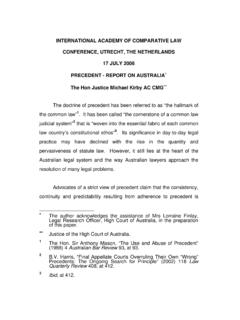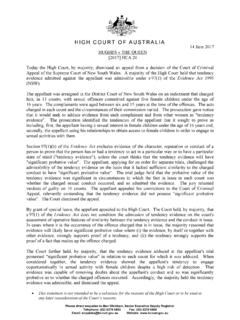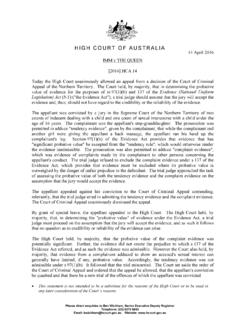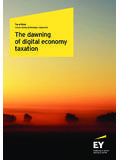Transcription of SUPREME AND FEDERAL COURTS JUDGES …
1 SUPREME AND FEDERAL COURTS JUDGES CONFERENCE WEDNESDAY, 23 JANUARY 2008 SYDNEY "THE VANISHING TRIAL" It is now just over a century since Dean Roscoe Pound disturbed the quiet equanimity, not to say complacent self-satisfaction, of the American Bar Association with his paper entitled "The Causes of Popular Dissatisfaction with the Administration of Justice". The paper was given on the evening of 29 August 1906 in St Paul, Minnesota. Pound was then Dean at the University of Nebraska. The paper caused a storm. John Wigmore, the famous evidence scholar, was present at the meeting and he described the speech and its aftermath in a paper whose title captured his view of what the paper had done. Wigmore called his paper "The Spark that Kindled the White Flame of Progress Pound's St Paul Address of 1906"1. Meetings of the Conference of Chief Justices and Conference of State Court Administrators, held in Indianapolis Indiana in 2006, celebrated Pound's work and examined whether the problems Pound had identified in his 1906 speech still faced the American judicial system.
2 The general view seemed to be that the system was no longer _____ 1 (1962) 40 American Law Review 729 at 730. 2. facing problems of the same kind. Whether that is so is not a matter about which I can or should offer any view. What has any of this to do with the subject of my paper? I am here to speak about the phenomenon of the vanishing trial. Why do I refer to the work of Roscoe Pound? I refer to Pound's work because if we are confronted with the phenomenon of the vanishing trial, we need to ask why that is so. In particular, we have to ask whether trials are "disappearing" because there are causes for "popular dissatisfaction with the administration of justice". Where does this notion of trials disappearing come from? In the winter 2004 edition of the American Bar Association Journal "Litigation", Patrica Lee Refo, Chair of the Litigation Section of the ABA, announced that that section of the Association had undertaken a major project to consider three questions: first whether the trial was an "endangered species" in American COURTS , second whether the number of trials was declining and, if it was, why, and third "should we care?
3 ". There had been a deal of debate in America, about this subject, before the ABA took up its inquiry. For example, Judge Patrick Higginbotham of the United States Court of Appeal for the Fifth Circuit, writing in 2002, had described the decline of trials as one of the most 3. significant changes in the American judicial system since the Nation's founding. His views were captured in an article aptly entitled "So Why Do We Call Them Trial COURTS ?"2. And a deal of academic work has now been undertaken in the United States about the subject3. When the ABA took up the inquiries I have described, it discovered that United States FEDERAL COURTS had tried fewer cases in 2002 than they had in 1962, despite there having been a five-fold increase in the number of civil cases instituted and more than doubling of the numbers of criminal proceedings filed. In 1962, per cent of FEDERAL civil cases were disposed of by trial but by 2002 only per cent were disposed of at trial.
4 I do not know whether similar statistics have been gathered in Australia. But I have the clear impression that over the last 15 or 20 years, perhaps longer, the number of civil cases tried to judgment in Australia's State and Territory SUPREME COURTS , and in the FEDERAL Court of Australia, either has diminished, or at least has not kept up with the increase in the number of judicial officers in those COURTS or the increase in the size of the population. My impression is that this is so no matter _____ 2 (2002) 55 Southern Methodist University Law Review 1405. 3 See, for example, Galanter, "The Vanishing Trial: An Examination of Trials and Related Matters in FEDERAL and State COURTS ", (2004) 3 Journal of Empirical Legal Studies 459; Ostrom, et al, "Examining Trial Trends in State COURTS : 1976-2002", (2004) 3 Journal of Empirical Legal Studies 757. 4. whether the comparison is made between raw numbers or only between the proportions of cases issued that are tried to judgment.
5 And my further impression is that statutory modifications to rights to claim damages for accident-related injuries do not provide a complete explanation for these changes. We need to know whether these impressions are right and, if they are, why this has happened. Let me deal with, but then put aside, one form of comparison with the United States. You will recall that I said that there had been a sharp decline in the number of criminal trials in United States FEDERAL COURTS . One very important reason for that is that plea bargaining is often the only way an accused person can have any real influence on what will happen to them. If they are convicted at trial of the offences originally alleged against them the trial judge has little discretion about what sentence will be imposed and it will be much heavier than it would have been if there had been an early guilty plea. If the accused can make some deal with the prosecutor to plead guilty to some lesser charge, the sentencing consequences can be very large.
6 There are, therefore, very powerful reasons not to go to trial. In Australia, the disposition of civil litigation over the last 20 years has been greatly affected by the adoption of managerial judging techniques and by an increasing emphasis upon alternative dispute resolution methods. It is tempting to conclude that those two considerations together provide a sufficient explanation for any diminution in the number of civil cases being disposed of at trial. It is 5. equally tempting then to assert that both the result achieved (significant diminution in the number of civil matters tried) and the means used to achieve that result (managerial judging and ADR) are marks of success which neither permit nor require any further examination4. The central thesis of this paper is that we must not conclude our enquiries at this point. We must dig deeper in order to understand better why fewer civil disputes are being determined by the application of judicial power. Do those reasons reveal any causes of popular dissatisfaction with the administration of justice to which we should be giving attention?
7 Our enquiries must begin from some basic premises. First, an essential element of the organisation and government of this society is that it should be possible to submit legal disputes to independent COURTS for resolution according to law. The quelling of controversies by the application of judicial power of the polity is a fundamental feature of the organisation and government of this society. Engaging that process is not to be seen as a failure. It is a defining element of the government of the society in which we live. Secondly, most civil disputes settle. As Abraham Lincoln said to an audience of lawyers: "Discourage litigation. Persuade your neighbours to compromise whenever you can. Point out to them how _____ 4 Compare, however, the views of Professor Judith Resnick, "Managerial JUDGES ", (1982) 96 Harvard Law Review 373 and Professor Owen Fiss, "Against Settlement", (1984) 93 Yale Law Journal 1073. 6. the nominal winner is often a real loser in fees, expenses and waste of time.
8 " Resolution of controversies by the application of judicial power is, in that sense, the solution of last resort. And cases can be settled at any time up to and including the moment before final orders are pronounced. Third, resolution of disputes according to law is usually best achieved with skilled and experienced representation for the parties. It is a deliberate process that takes time. It is therefore expensive. It is expensive because of the need to use skilled representatives and because the process takes time and effort. Fourth, the amount of time and effort that must be expended is directly related to the number and type of issues that are in play. The more issues there are in a case, the longer its resolution will take. The more uncertainty there is about the content or application of the legal principles that are relevant to the dispute, the less predictable is its outcome. If the outcome is not predictable, it will often be harder to settle the dispute and its trial will be protracted.
9 All this being so, should not the judiciary take pride in the phenomenon of the disappearing trial? If cases are settling because the prospect of trial is too horrid for parties to contemplate, settlement may mark the failure of the system, not its success. If cases are settling because they are managed to the point of the parties' exhaustion, the system has failed them. If cases are 7. settling because one party is able so to prolong and complicate the litigation as to outlast a financially weaker party, the system fails. Settlement in those circumstances is a mark of failure not success. No less importantly, are there controversies which parties are choosing not to submit to resolution by the application of judicial power, and instead resolving by other methods, because they are dissatisfied with the ways in which the judicial system is administered during and before trial? If there is a significant number of cases in which parties are dissatisfied in the manner described, there truly is popular dissatisfaction with the administration of justice.
10 There are some limits to what the COURTS can do about the questions I have identified. We need to be well aware of these limits. First and foremost among the limits is that the COURTS must, of course, work within the bounds of applicable legislation. Not all legislation shortens trials. Some legislation has so many discretions built in to it that it is not always possible to predict with any confidence how the relevant discretion should be exercised. The so-called uniform Evidence Act may be thought to provide some examples of a problem of this kind. It is not always easy to see whether particular pieces of evidence should be admitted or excluded. The difficulty of making that prediction encourages litigants to "chance their arm". More than that, the piling of discretion upon discretion may encourage argument about ancillary questions of evidence and if it has that effect the trial is prolonged. Further, evidence of disputable admissibility may lie at the 8.










